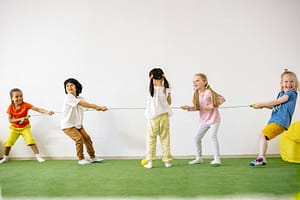Nurturing Little Geniuses: Simple, Joyful Ways to Help Your Child’s Mind Blossom
Every parent’s heart swells with pride when their child learns something new—whether it’s their first wobbly steps, their first scribbled letters, or the moment they proudly solve a math problem all by themselves.
We all want our children to grow up curious, confident, and capable—not just to ace tests, but to love learning, to ask big questions, and to face challenges with a spark of determination.
But here’s the beautiful truth : intelligence isn’t just something kids are born with.
It’s something we help them build—day by day, through small, loving actions. Science shows us that the way we talk, play, and even snuggle at bedtime shapes their growing minds in powerful ways 🌱✨
So, let’s explore 10 simple, joyful ways to nurture your child’s intelligence—without pressure, without stress, just with love and a little bit of know-how.
1. The Magic of Melodies: Why Music Makes Minds Grow:
Why it works : Music isn’t just fun—it’s like a workout for the brain! When kids learn an instrument, their minds light up in extraordinary ways. Playing music strengthens memory, sharpens focus, and even helps with math and language skills. It’s as if every note builds a tiny bridge between different parts of their brain, helping them think faster and more creatively.
Imagine this: A little girl practices the piano every day, stumbling at first but slowly mastering her scales. Over time, her fingers fly across the keys—and her brain starts making connections faster, too. When she sits down to solve a tricky puzzle at school, she doesn’t give up easily. She’s used to practicing, to trying again and again. That’s the power of music!
How to make it happen:
–Start small—a toy drum, a xylophone, or even singing nursery rhymes together.
Turn practice into playtime. Dance while they play, or make up silly songs about their day.
If they lose interest, switch instruments! The goal isn’t perfection—it’s joy.
2. Running, Jumping… and Smarter Thinking?
Why it works : Movement isn’t just for muscles—it’s brain fuel! When kids exercise, their brains get a rush of oxygen and energy, making it easier to learn, remember, and stay focused. Studies show that after running around, children pick up new words quicker and solve problems better. It’s like their minds wake up and say, “Okay, I’m ready now!”
Picture this: A boy races his friends at the park, laughing and breathless. Later, when he sits down to read, the words seem clearer, the story more exciting. His brain is in high gear, thanks to all that play.
How to make it happen:
– Turn study breaks into mini dance parties or obstacle courses.
– Walk or bike to school when possible—it’s a great brain warm-up!
– Team sports teach discipline, too—win or lose, they’re learning resilience.
3. Storytime Secrets: The Right Way to Read Together
Why it works: Reading to kids is lovely, but reading with them? That’s where the magic happens.
When you point to words, ask questions, and let them guess what comes next, you’re not just sharing a story—you’re building their future reading skills. Kids who engage with books this way learn to read earlier and love it more.
A little story: Maya’s dad used to read while she gazed at the pictures. Then he started pausing: “What do you think the fox will do?” Soon, Maya was “reading” along, making up her own endings. Now, at six, she devours books like candy.
How to make it happen:
– For toddlers: “Can you find the red balloon on this page?”
– For older kids: “Why do you think she did that?”
– Let them “read” to you—even if it’s just retelling a familiar tale.
4. The Secret Power of Sleep: Why Bedtime Builds Brains
Why it works: Sleep isn’t just rest—it’s when little brains grow!
Missing even one hour can turn a bright-eyed third grader into a foggy-headed version of themselves. During sleep, their brain organizes memories, solves problems, and recharges for new learning.
Well-rested kids are calmer, sharper, and more creative.
Imagine this: Two sisters—one goes to bed on time, the other stays up late watching videos. Next morning, the first breezes through her math homework while the second struggles to focus. That extra hour made all the difference!
How to make it happen:
– Create a cozy bedtime ritual (story + cuddles = perfect wind-down).
– Keep screens off at least an hour before bed—try quiet music instead.
– Be consistent, even on weekends. Their brain thrives on routine!
5. The Superpower of Stick-to-It: How Grit Outshines IQ
Why it works: Natural smarts are great, but kids who learn to keep trying—even when things get hard—go further in life.
It’s called grit, and it’s what turns “I can’t do this” into “I’ll try one more time.” These kids don’t give up easily, whether it’s a tough math problem or learning to ride a bike.
A real-life moment: Leo kept falling off his skateboard, knees scraped, eyes teary. His dad didn’t say “Maybe it’s not for you”—he said, “Remember when you couldn’t swim? Look at you now!” Two weeks later, Leo was rolling down the sidewalk, grinning.
How to make it happen:
– Praise effort, not just results: “You worked so hard on that!”
– Share stories of famous people who failed before succeeding (Einstein flunked math!).
– When they’re frustrated, say: “Let’s take a break, then try again.”
6. Hands-On = Brains-On: Why Kids Learn Best by Doing
Why it works: Passive learning (like staring at screens) doesn’t stick. But when kids do things—build, create, experiment—their brains light up like fireworks. That’s why a simple baking session teaches fractions better than a worksheet, and why gardening makes science come alive.
Sweet example: Instead of memorizing how plants grow, Aisha planted beans in a jar. Every morning, she raced to check the roots. When they sprouted leaves, she shouted, “I GREW A PLANT!” That excitement? That’s real learning.
How to make it happen:
– Turn chores into science (Why do bubbles form in soapy water?).
– Cook together—measuring ingredients teaches math naturally.
– Ask open-ended questions: “What happens if we mix these colors?”
7. Smart Fuel: How Food Powers Little Thinkers
Why it works: Just like a car needs good gas, brains need good food. Sugary snacks cause energy crashes, but nuts, berries, eggs, and whole grains give steady fuel. Oddly, a bit of dark chocolate during study time can help focus (thank you, science!).
Fun fact: Omega-3s in fish and walnuts literally help build brain cells. One study found kids who ate omega-3s regularly had better reading skills!
How to make it happen:
– Keep healthy snacks visible (apple slices with peanut butter = kid fuel).
– Involve them in grocery shopping: “Which brain-boosting foods should we get?”
– Save treats for *after* homework—it’s a sweet reward!
8. The Happiness Advantage: Why Joyful Kids Learn Faster
Why it works: Stressed brains don’t learn well. But when kids feel safe and happy, their minds open like flowers in sunlight. Happy kids are more creative, solve problems better, and bounce back from mistakes faster. And guess what? Your calm presence is their anchor.
Heartwarming truth: A study found that when moms simply smiled more, their toddlers attempted harder tasks—because they felt braver.
How to make it happen:
– Start the day with a hug and “I love you”—it sets their emotional tone.
– Laugh together often. Tell silly jokes during homework breaks.
– When they’re upset, listen first. A heard child is a secure child.
9. The Friend Effect: How Playmates Shape Minds
Why it works: Kids rise (or sink) to the level of their friends. A curious, kind peer group sparks motivation—suddenly, reading is cool, and science projects are fun! Even one studious friend can rub off on your child.
A teacher’s observation: Ms. Lee noticed when quiet Sam paired with chatty Liam for projects, Sam started speaking up more—and Liam’s grades improved. They balanced each other perfectly.
How to make it happen:
– Arrange playdates with kids who love learning (library trips, museum visits).
– Talk about admirable traits: “I love how Sofia always finishes her drawings!”
– Encourage group study—they’ll teach each other in ways adults can’t.
10. The Power of “You Can Do It”: How Belief Builds Brains
Why it works: When a child knows you believe in them, they start believing in themselves. Famous studies show that when teachers expected certain kids to excel—even randomly chosen ones—those kids *did* excel. Your words shape their self-image.
A moment to remember: When little Nora failed her spelling test, her mom didn’t scold. She said, “Next time, you’ll do better. I believe in you.” The following week, Nora practiced twice as hard—and aced it.
How to make it happen:
– Never label them (“You’re bad at math”)—say, “Math is tricky, but you’ll get it.”
– Celebrate small wins: “You read that whole page by yourself!”
– Share stories of your own struggles and how you overcame them.
A Final Thought:
Love Is the Best Brain Booster
At the end of the day, intelligence isn’t just about grades or test scores. It’s about raising a child who loves to learn, who sees challenges as adventures, and who knows—deep in their heart—that they are capable of amazing things.
You don’t need fancy gadgets or expensive tutors. Just your time, your attention, and your belief in them. When a child feels safe, loved, and encouraged, their mind grows in ways we can’t even measure.
So sing off-key together. Get muddy in the garden. Stay up late stargazing and wondering aloud. These are the moments that shape brilliant minds—and even more importantly, happy hearts.
Keep nurturing, keep cheering them on, and watch the magic unfold.🌱✨











